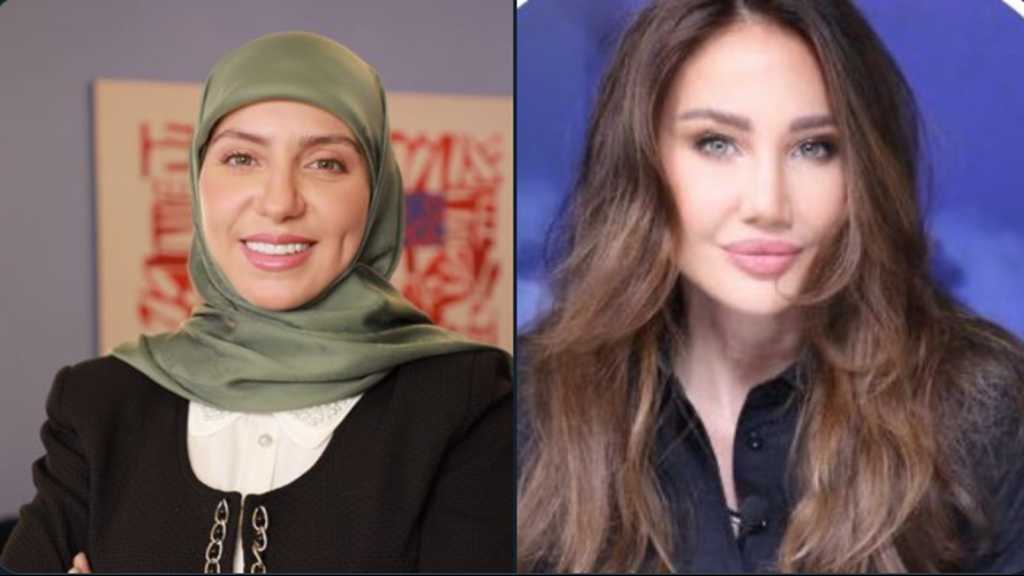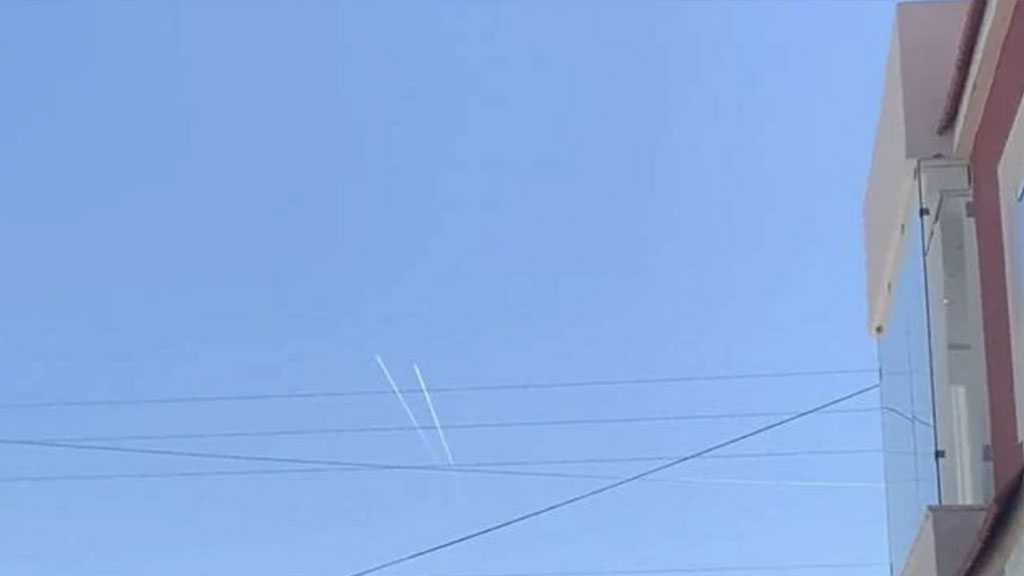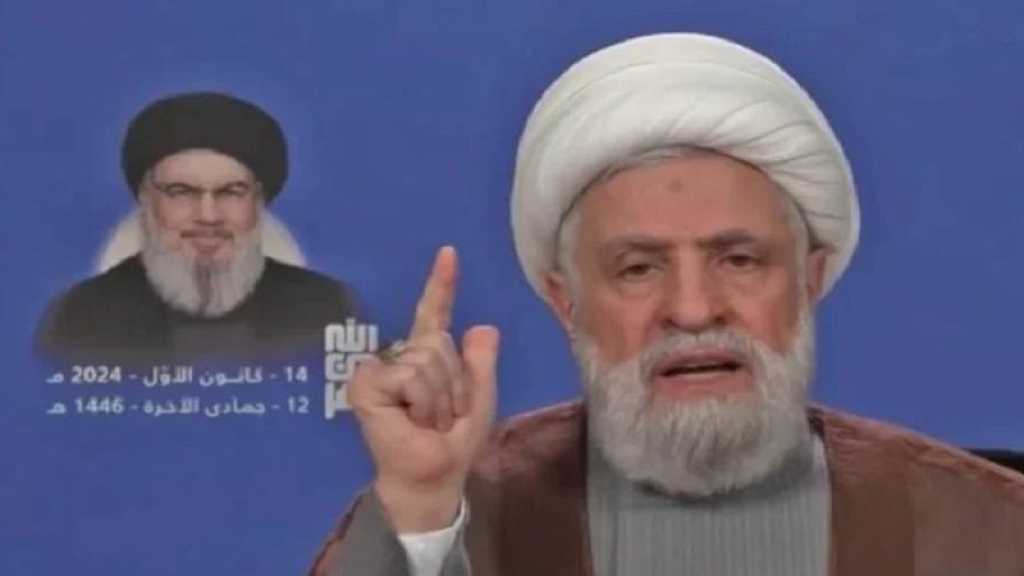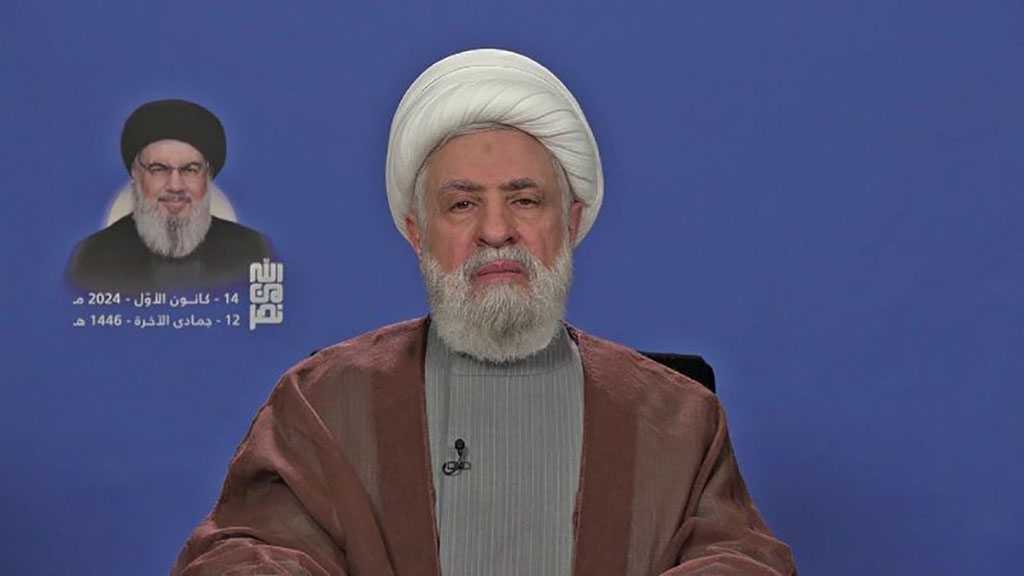
Sayyed Nasrallah Reveals July Victory Secrets in Al-Mayadeen Interview
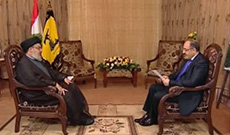
Nour Rida
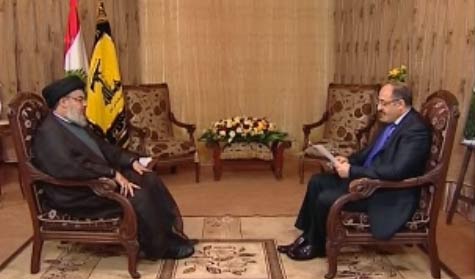
On the 14th of August 2013, Hizbullah Secretary General His Eminence Sayyed Hassan Nasrallah appeared in a televised interview to reveal some secrets of the 2006 divine victory achieved by the Islamic Resistance in its confrontation with the Zionist enemy during the 33-day July war.
The Hizbullah leader said that the Resistance will not allow any "Israeli" land breaches against Lebanon, iterating that the Resistance fighters are always ready to confront the "Israelis" with the appropriate means.
In an exclusive interview with Ghassan Bin Jiddo on Beirut-based satellite televsion station al-Maydeen, Sayyed Nasrallah stated that foreign powers, meaning the US and the West, have offered to accept that Hizbullah keeps its weaponry in a deal in which the Resistance agrees to abandon the Palestinian cause.
We Insist on Staying A Resistance
Sayyed Nasrallah spotted the real issue with the West noting "The real problem to the US, the West, and a majority of Arab countries is that we are a resistance and we insist on staying a resistance. [Former US vice-president] Dick Cheney had offered us international acknowledgement, and lifting our name off the terror blacklist if we keep our arms but give verbal guarantee behind the scenes to let go the Palestinian cause but we refused. What is the value of our weapons if we do so?!"
Sayyed Nasrallah assured that the West had offered huge proposals if the Resistance pledges not to confront "Israel", but he accentuated that Palestine is a central cause to defend; it is a matter of belief and principle.
Labbouneh Incident Clear Violation, Resistance Will Confront "Israel"
On the Labbouneh explosion that killed four "Israeli" soldiers during two patrols' incursion into Lebanese land, Sayyed Nasrallah, emphasized "It is a clear "Israeli" violation during which two forces entered Lebanese territories," noting that the "Israelis", as well as some Lebanese tried to undermine the incident.
"What happened is that when two "Israeli" patrols - each with 12 to 13 soldiers- crossed the border, one crossed first and came across a bomb that was planted recently by Hizbullah after we received information that there will be an incursion."
According to Sayyed Nasrallah, what happened in Labbouneh took place under the sight of the resistance's fighters, who had planted explosive devices there; a newly planted explosive device and not a remnant of the July 2006 war.
"The occurrence was an intended operation and did not happen by coincidence," Sayyed Nasrallah explained, and underscored that "This operation will not be the last; we will not be lenient with land violations against our land. Whenever we feel that the "Israelis" have entered Lebanese soil, we will act appropriately. We will cut the feet that violate Lebanese territory."
Hizbullah SG wondered how some sides in Lebanon consider Syria as enemy, at the time they do not consider "Israel" as such. "For instance, if 8 or 10 Syrian soldiers enter Lebanese territories Syria is an enemy, but in the case of "Israel" it isn't."
On Lebanese President Michel Suleiman's complaint to the UN against "Israel's" incursion in Labbouneh, Sayyed Nasrallah evaluated it as a "weak stance".
He went on to say "After May 25, 2000, people celebrated the liberation but we considered that we should start readying ourselves for any war waged by "Israel" against Lebanon. The Resistance in 2000 served "Israel" a strategic defeat, as the Zionist entity's point of weakness is losses."
Divine Victory: 2006 July War Secrets Revealed
His Eminence assured the Resistance could have launched many more rockets than those used in the July 2006 war, as the Resistance fighters, who enjoy a strong trait among them; friendship, were ready for a long battle, no less than six months."
Also, he added "When the kidnap of the two "Israeli" soldiers took place, we were ready on the human and logistic levels for any war. During the 33 days of war, the resistance was not confused or lost on ground in managing the operation; it rather had a clear vision because we were already expecting it."
Sayyed Nasrallah explained that one major strength point the "Israelis" did not even have in mind was the Hizbullah means of wired and wireless communication, where there was constant communication between operation rooms in the different regions, also among the Mujahideen.
Concerning the surprise on targeting the "Israeli" battleship Sayyed Nasrallah announced during the first days of the "Israeli" aggression on Lebanon, His Eminence expressed "We were keen on announcing the news at the exact time the battleship was targeted at sea."
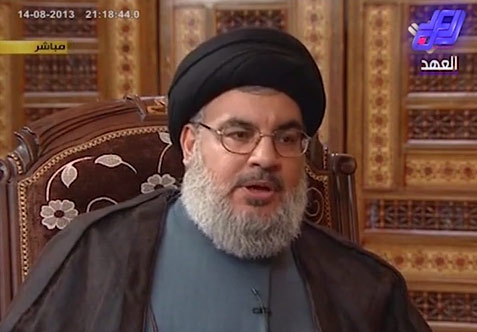 On July 14 2006, witnessed by millions of viewers and only a few days after the start of the Zionist aggression on Lebanon, Hizbullah Secretary General Sayyed Hassan Nasrallah surprised everyone, friend and foe alike, when he announced that the surprises he had promised are about to start now, stating the following verbatim: "Now at sea, the "Israeli" battleship that attacked our infrastructure and people's homes and civilians, watch it burn and sink, to drown with it dozens of Zionist soldiers. This is only the beginning and we will meet at the end (of this battle) to talk at length."
On July 14 2006, witnessed by millions of viewers and only a few days after the start of the Zionist aggression on Lebanon, Hizbullah Secretary General Sayyed Hassan Nasrallah surprised everyone, friend and foe alike, when he announced that the surprises he had promised are about to start now, stating the following verbatim: "Now at sea, the "Israeli" battleship that attacked our infrastructure and people's homes and civilians, watch it burn and sink, to drown with it dozens of Zionist soldiers. This is only the beginning and we will meet at the end (of this battle) to talk at length."Sayyed Nasrallah also revealed that Hizbullah, during the July war had capabilities that allowed it target Tel Aviv, elaborating "When I said what lies beneath Haifa I meant Tel Aviv". According to Sayyed Nasrallah, what protected Beirut in 2006 was the resistance and not a political decision.
One of the major reasons of "Israel's" failure during the July aggression, he stated, was its weakness in obtaining correct information, citing the example of information they received that the "Israeli" captives were in Baalbeck city, where "Israel" conducted several unsuccessful airdrops which cost them lives.
Sayyed Nasrallah assured that during the war, many agents working for "Israel" were captured by Hizbullah, they were not killed but were handed to the Lebanese state.
Upon a question about his stay during the war, in light of constant "Israeli" claims that the Hizbullah leader was in hide, Sayyed Nasrallah narrated he was in the Dahiyeh, also visited West Beirut along with Haj Imad Moghnieh and other Resistance figures, where he was surprised to see a normal life. "We walked down the roads of Beirut; I was surprised at the scene of normal life, as if Dahiyeh and Beirut were two separate states. We saw the people, the restaurants; we even bought sandwiches and ice-cream."
Haj Imad, who accompanied Sayyed Nasrallah many times during the July "Israeli" aggression, was head of the Jihadist Hizbullah body, as expressed by Hizbullah SG. Recalling Haj Imad's attitude during the war, Sayyed Nasrallah said "During the 33 days, Haj Imad was never stressed out, he felt calm, confident, and had strong belief."
Resistance Received Weapons from Syria
Praising the Syrian role in its support to the Resistance, Sayyed Nasrallah went on to say: "We owe Syria and we have to admit that we did receive weapons from Syria. The Syrian regime received our people, supported us and opened its weapon stocks to the resistance. The regime was even ready to fight with us."
"The source of the Kornet anti-missiles was Syria. Syrian President Bashar al-Assad contacted us and voiced his country's willingness to send troops to Lebanon's Hasbaya in prevention of any attack against Syria. But I told [al-Assad] that we are not willing to head to a regional war, and that the Resistance is capable of winning this battle on its own," Sayyed Nasrallah recalled. He accentuated the Resistance did not need weapons from Iran during the war because it already had weapons.
Getting Rid of the Resistance Battle
On the governmental level, Sayyed Nasrallah pointed out that PM [at that time] Fouad Siniora was not trustworthy when it comes to the negotiations during the war. Had we entrusted them [Siniora and his team] with our necks they would have cut them.
"We delegated [House Speaker] Nabih Berri, and not [former President] Emil Lahoud, to negotiate in our name during the war because Lahoud's term was extended and he was boycotted from the inside and outside. I trusted Berri because he is one of the leaders of the resistance, and he was the parliament's speaker. We shared a partnership of fate and blood," Sayyed Nasrallah stressed.
Moreover, Sayyed Nasrallah considered "I was not surprised by [Change and Reform bloc leader MP, head of the Free Patriotic movement] Michel Aoun's support for the resistance during the war."
"The March 14 coalition's sole is to get rid of the resistance's weapons and not to draw a defense strategy," he noted.
"Since the beginning of the war, the Lebanese government adopted the "Israeli" point of view and wanted us to hand over the resistance's weapons, accept the deployment of international troops and hand over the two "Israeli" captives," he further added.
Sayyed Nasrallah assured the March 14 coalition had no feelings of sympathy with the Resistance, not even on the humanitarian and ethical levels. Also, he emphasized that many Arab countries involved in this war wanted to crush the resistance, including Saudi Arabia and Egypt under the rule of Hosni Mubarak.
The Resistance leader recalled that Saudi Prince Nayef [bin Abdulaziz Al Saud] told one Lebanese politician that there is an international decision to crush Hizbullah. Also, Sayyed Nasrallah highlighted "Israel's" delegate to the UN suddenly asked Hamad Bin Jassem to stop the war, and during the last days of war, some "Israeli" officials said if the war went on "Israel" would have collapsed."
"Had the government been national and in harmony, we could have ended the war with conditions imposed by Lebanon, we could have retrieved the Shebaa farms, the Kafarshouba hills and freed our captives. Unfortunately the political battle was inside Lebanon rather than in the UN Security Council," Sayyed Nasrallah elaborated.
Asked about the government, Sayyed Nasrallah stressed that Lebanon needs a national unity government, with Tammam Salam as Prime Minister, noting that MP Saad Hariri's request that the Future party and Hizbullah withdraw from the government is an American demand.
On the Turkish pilot and co-pilot abduction, Sayyed Nasrallah assured Hizbullah has nothing to do with it.
Concerning Egypt, Sayyed Nasrallah advised the Egyptians to head to dialogue, as it is the sole solution to the situation.
At the end of the interview, Sayyed Nasrallah, thanked the people of the resistance for their tolerance and sacrifices. He accentuated the Resistance is much stronger than it was during the 33-day aggression, reiterating "the era of defeats has gone and the era of victories has arrived."
Source: Al-Ahed News
Comments
